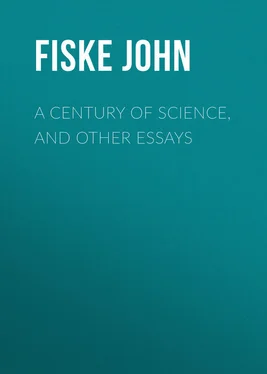John Fiske - A Century of Science, and Other Essays
Здесь есть возможность читать онлайн «John Fiske - A Century of Science, and Other Essays» — ознакомительный отрывок электронной книги совершенно бесплатно, а после прочтения отрывка купить полную версию. В некоторых случаях можно слушать аудио, скачать через торрент в формате fb2 и присутствует краткое содержание. Жанр: foreign_antique, foreign_prose, на английском языке. Описание произведения, (предисловие) а так же отзывы посетителей доступны на портале библиотеки ЛибКат.
- Название:A Century of Science, and Other Essays
- Автор:
- Жанр:
- Год:неизвестен
- ISBN:нет данных
- Рейтинг книги:3 / 5. Голосов: 1
-
Избранное:Добавить в избранное
- Отзывы:
-
Ваша оценка:
- 60
- 1
- 2
- 3
- 4
- 5
A Century of Science, and Other Essays: краткое содержание, описание и аннотация
Предлагаем к чтению аннотацию, описание, краткое содержание или предисловие (зависит от того, что написал сам автор книги «A Century of Science, and Other Essays»). Если вы не нашли необходимую информацию о книге — напишите в комментариях, мы постараемся отыскать её.
A Century of Science, and Other Essays — читать онлайн ознакомительный отрывок
Ниже представлен текст книги, разбитый по страницам. Система сохранения места последней прочитанной страницы, позволяет с удобством читать онлайн бесплатно книгу «A Century of Science, and Other Essays», без необходимости каждый раз заново искать на чём Вы остановились. Поставьте закладку, и сможете в любой момент перейти на страницу, на которой закончили чтение.
Интервал:
Закладка:
When Spencer's book on "Education" failed to find favour in Boston the Appletons took it, and thus presently secured the management of the philosophical series. This brought Youmans into permanent relations with Spencer and his work. In 1861 Youmans was married, and in the course of the following year made a journey in Europe with his wife. It was now that he became personally acquainted with Spencer, and found him quite as interesting and admirable as his books. Friendships were also begun with Huxley and other foremost men of science. From more than one of these men I have heard the warmest expressions of personal affection for Youmans, and of keen appreciation of the aid that they have obtained in innumerable ways from his intelligent and enthusiastic sympathy. But no one else got so large a measure of this support as Spencer. As fast as his books were republished Youmans wrote reviews of them, and by no means in the usual perfunctory way; his reviews and notices were turned out by the score, and scattered about in the magazines and newspapers where they would do the most good. Whenever he found another writer who could be pressed into the service, he would give him Spencer's books, kindle him with a spark from his own magnificent enthusiasm, and set him to writing for the press. The most indefatigable vender of wares was never more ruthlessly persistent in advertising for lucre's sake than Edward Youmans in preaching in a spirit of the purest disinterestedness the gospel of evolution. As long as he lived, Spencer had upon this side of the Atlantic an alter ego ever on the alert with vision like that of a hawk for the slightest chance to promote his interests and those of his system of thought.
Among the allies thus enlisted at that early time were Mr. George Ripley and the Rev. Henry Ward Beecher, both of whom did good service, in their different ways, in awakening public interest in the doctrine of evolution. In those days of the Civil War it was especially hard to keep up the list of subscribers in an abstruse philosophical publication of apparently interminable length. Youmans now and then found it needful to make a journey in the interests of the work, and it was on one of these occasions, in November, 1863, that I made his acquaintance. I had already published, in 1861, an article in one of the quarterly reviews, in which Spencer's work was referred to; and another in 1863, in which the law of evolution was illustrated in connection with certain problems of the science of language. The articles were anonymous, as was then the fashion, and Youmans' curiosity was aroused. There were so few people then who had any conception of what Spencer's work meant that they could have been counted on one's fingers. At that time I knew of only three: the late Professor Gurney, of Harvard; Mr. George Litch Roberts, now an eminent patent lawyer in Boston; and Mr. John Spencer Clark, now of the Prang Educational Company. I have since known that there were at least two or three others about Boston, among them my learned friend the Rev. William Rounseville Alger, besides several in other parts of the country. When we sometimes ventured to observe that Spencer's work was as great as Newton's, and that his theory of evolution was going to remodel human thinking upon all subjects whatever, people used to stare at us and take us for idiots. Any one member of such a small community was easy to find; and I have always dated a new era in my life from the Sunday afternoon when Youmans came to my room in Cambridge. It was the beginning of a friendship such as hardly comes but once to a man. At that first meeting I knew nothing of him except that he was the author of a textbook of chemistry which I had found interesting, in spite of its having been crammed down my throat by an old-fashioned memorizing teacher who, I am convinced, never really knew so much as the difference between oxygen and antimony. At first it was a matter of breathless interest to talk with a man who had seen Herbert Spencer. But one of the immediate results of this interview was the beginning of my own correspondence and intimate friendship with Spencer. And from that time forth it always seemed as if, whenever any of the good or lovely things of life came to my lot, somehow or other Edward Youmans was either the cause of it, or at any rate intimately concerned with it. The sphere of his unselfish goodness was so wide and its quality so potent that one could not come into near relations with him without becoming in all manner of unsuspected ways strengthened and enriched.
In the autumn of 1865 we were dismayed by the announcement that Spencer would no longer be able to go on issuing his works. In London they were published at his own expense and risk, and those books which now yield a handsome profit did not then pay the cost of making them. By the summer of 1865 there was a balance of £1100 against Spencer, and his property was too small to admit of his going on and losing at such a rate. As soon as this was known, John Stuart Mill begged to be allowed to assume the entire pecuniary responsibility of continuing the publication; but this, Mr. Spencer, while deeply affected by such noble sympathy, would not hear of. He consented, however, with great reluctance, to the attempt of Huxley and Lubbock, and other friends, to increase artificially the list of subscribers by inducing people to take the work just in order to help support it. But after several months the sudden death of Spencer's father added something to his means of support, and he thereupon withdrew his consent to this arrangement, and determined to go on publishing as before, and bearing the loss.
But as soon as the first evil tidings reached America Youmans made up his mind that $5500 must be forthwith raised by subscription, in order to make good the loss already incurred. It is delightful to remember the vigour with which he took hold of this work. The sum of $7000 was raised and invested in American securities in Spencer's name. If he did not see fit to accept these securities, they would go without an owner. The best of Waltham watches was procured for Spencer by his American friends; a letter, worded with rare delicacy and tact, was written by the late Robert Minturn; and Youmans sailed for England to convey the letter and the watch to Spencer. It was a charming scene on a summer day in an English garden when the great philosopher was apprised of what had been done. It was so skilfully managed that he could not refuse the tribute without seeming churlish. He therefore accepted it, and applied it to extending his researches in descriptive sociology.
Of the many visits which Youmans made to England, now and then extending them to the Continent, one of the most important was in 1871, for the purpose of establishing the International Scientific Series. This was a favourite scheme of Youmans. He realized that popular scientific books, adapted to the general reader, are apt to be written by third-rate men who do not well understand their subject; they are apt to be dry or superficial, or both. No one can write so good a popular book as the master of a subject, if he only has a fair gift of expressing himself and keeps in mind the public for which he is writing. The master knows what to tell and what to omit, and can thus tell much in a short compass and still make it interesting; moreover, he avoids the inaccuracies which are sure to occur in second-hand work. Masters of subjects are apt, however, to be too much occupied with original research to write popular books. It was Youmans' plan to induce the leading men of science in Europe and America to contribute small volumes on their special subjects to a series to be published simultaneously in several countries and languages. Furthermore, by special contract with publishing houses of high reputation, the author was to receive the ordinary royalty on every copy of his book sold in every one of the countries in question; thus anticipating international copyright upon a very wide scale, and giving the author a much more adequate compensation for his labour. To put this scheme into operation was a task of great difficulty, so many conflicting interests had to be considered. Youmans' brilliant success is attested by that noble series of more than fifty volumes, on all sorts of scientific subjects, written by men of real eminence, and published in England, France, Italy, Germany, and Russia, as well as in the United States.
Читать дальшеИнтервал:
Закладка:
Похожие книги на «A Century of Science, and Other Essays»
Представляем Вашему вниманию похожие книги на «A Century of Science, and Other Essays» списком для выбора. Мы отобрали схожую по названию и смыслу литературу в надежде предоставить читателям больше вариантов отыскать новые, интересные, ещё непрочитанные произведения.
Обсуждение, отзывы о книге «A Century of Science, and Other Essays» и просто собственные мнения читателей. Оставьте ваши комментарии, напишите, что Вы думаете о произведении, его смысле или главных героях. Укажите что конкретно понравилось, а что нет, и почему Вы так считаете.












